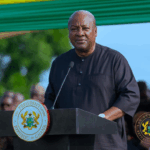
President John Dramani Mahama has called for urgent reforms within Ghana’s judicial system.
He stressed that justice must be made more transparent, efficient, and accessible to all citizens not just the privileged few.
Speaking during the swearing-in ceremony of newly appointed justices of the Court of Appeal, President Mahama linked the country’s judicial transformation to his broader “reset agenda”, which he said extends beyond rebuilding infrastructure or expanding the economy.
“Our reset agenda is not only about rebuilding infrastructure or expanding the economy,” he stated. “It’s also about fostering a more inclusive society. Transparent justice is the cornerstone of this reset.”
Mr Mahama, who is also the flagbearer of the opposition National Democratic Congress (NDC), highlighted several justice sector reforms outlined in the party’s 2024 manifesto. These include:
- Digitising the court system to minimise delays and endless adjournments that frustrate ordinary citizens;
- Creating specialised divisions within the High Courts and Courts of Appeal to handle land, commercial, and labour cases more efficiently;
- Expanding legal aid services to ensure justice is not reserved for the wealthy;
- Strengthening judicial ethics and accountability to stamp out misconduct and corruption.
“These are not abstract promises,” he said. “They are concrete steps foundations upon which every community and citizen can rely.”
Addressing the newly sworn-in justices directly, President Mahama emphasised the moral responsibility their new roles carry, particularly given the Court of Appeal’s position as the final legal recourse for many Ghanaians.
“The authority you assume today is not only legal but profoundly moral,” he remarked. “You hold in your hands the power to heal wounds, to restore confidence and to guide our nation towards fairness.”
He acknowledged recent public criticism of the judiciary but framed it as a sign of continued public faith in the institution.
“Criticism of judgments is not the end of hope it is the evidence of hope,” Mr Mahama said.
“It shows that Ghanaians still believe in the courts, that justice still matters, and that verdicts have meaning in their lives.”
He also issued a warning against the rise of public cynicism towards the judiciary, particularly the perception that the courts serve only the powerful and politically connected.
“To rebuild trust, our courts must demonstrate both in word and deed that justice is not compromised by status, wealth, or political convenience,” he cautioned.
The appointees include Mr Justice Daniel Mensah (Dormaahene Osagyefo Oseadeeyo Agyeman Badu II) and Mr Justice Senyo Amedahe, a Koforidua High Court judge.
Others are Justice Senyo Amedahe, Justice Olivia Boeng Owusu, Justice Douglas Seidu, Justice Ali Baba Bature, Justice Mariama Samo, Justice Abena Adzin Doku, Justice Mary Maame Akua Yanzu, Justice Justin Dorgu, Justice George Boadi, Justice Ayitey Armah-Tetteh and Justice Jennifer Anne Myers Ahmed.
The remaining include Justice John Bosco Nabarese, Justice Kwasi Anokye Gyimah, Justice Richmond Osei Hwere, Justice Apangano Achibonga, Justice Charity Akosua Asem, Justice Enyonam Adinyira, Justice Shiela Minta, Justice Bridget Kafui Antonio and Justice Franklina Gesila Adanu.